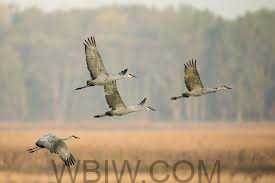
INDIANA – This week, Congressman Jim Baird (R-IN-04) and Indiana State Rep. Beau Baird (R-Greencastle) went birdwatching with Audubon Great Lakes and The Nature Conservancy at DePauw Nature Park in Greencastle, Indiana to discuss the importance of conservation solutions, like the Farm Bill, that will protect wildlife and local communities.

“Birds and migratory birds provide color, song, and beauty to our natural environment that can be enjoyed by everyone,” said Congressman Baird. “Property owners, whether it be a backyard or a large forest, appreciate the opportunity to preserve or enhance habitat that contributes to the well-being of these birds. I want to thank Audubon Great Lakes for inviting me to today’s bird walk. I look forward to our continued partnership as we work to support Indiana’s rural economies and improve the health of our environment.”

Indiana is a rich agricultural state. More than 80 percent of state land is devoted to farms, forests, and woodlands, and 95 percent of farms are family-owned or operated. The U.S. Farm Bill is the largest federal funding source for conservation on these lands.

“The fate of birds and other wildlife is tied to what happens on Indiana’s privately owned lands. Investments in Farm Bill conservation programs are key to restoring the habitats that birds and communities across Indiana depend on,” said Adam Forrer, Policy Director of Climate for Audubon Great Lakes. “Audubon thanks Congressman Jim Baird and Rep. Beau Baird for going on a bird walk. We appreciate the Congressman’s strong leadership on voluntary conservation efforts that benefit both wildlife and agricultural communities, and we look forward to continuing our work together to protect birds and people.”
Indiana has lost 85 percent of its original wetlands, and two-thirds of North American birds are at risk of extinction from climate change. Conservation funding in the Farm Bill will help to protect the places that birds need while buffering communities from the effects of climate change.

“As a lifelong resident of Greencastle, every day I get to enjoy our natural areas,” said Rep. Beau Baird. “Thank you to Audubon Great Lakes and the Nature Conservancy for inviting me on a bird walk today to learn more about the wildlife that call our region home.”
The bird walk was led by Audubon Great Lakes staff, who were joined by John Ketzenberger, Director of Government Relations for The Nature Conservancy, Laurie Voss, Executive Committee Member for Amos Butler Audubon Society, and Gabe Castillo, Purdue University Branch Leader for American Conservation Coalition.

“From farmers to wildlife – our shared livelihoods depend on solutions that will protect our state’s natural resources and address climate change,” said John Ketzenberger, Director of Government Relations for The Nature Conservancy in Indiana. “Thank you to Audubon for its work in protecting the places birds need, and to Congressman Baird for joining us today to experience Indiana’s incredible natural landscapes and the wildlife that depend on it.”

“Addressing climate change to protect people and wildlife – like the birds we saw here today – is a top priority for younger generations. Thank you, Congressman Baird, for your leadership on climate-smart practices that will benefit our environment while boosting our local economies,” said Gabe Tienstra, Purdue University Branch Leader for American Conservation Coalition.
At times during the bird walk, the group was adjacent to farmland as they made their way through DePauw Nature Park. A reclaimed limestone quarry, the park is now home to many birds and other wildlife. The group saw a Pileated Woodpecker, American Robins, and Dark-eyed Juncos during the bird walks.
About Audubon Great Lakes
Audubon Great Lakes is a regional office of Audubon; learn more at gl.audubon.org and follow us on Facebook, Twitter, and Instagram.
The National Audubon Society protects birds and the places they need, today and tomorrow. Audubon works throughout the Americas using science, advocacy, education, and on-the-ground conservation. State programs, nature centers, chapters, and partners give Audubon an unparalleled wingspan that reaches millions of people each year to inform, inspire, and unite diverse communities in conservation action. A nonprofit conservation organization since 1905, Audubon believes in a world in which people and wildlife thrive.



